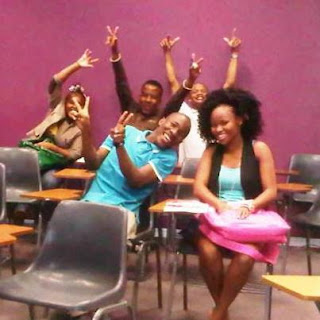So now I am reading about learning theories and schools of thought. You are joking right? You either learn or you don't and its really up to you as a student. You as a trainer can analyze if they are right or left brained, you can create activities and PowerPoint that accommodates both of them - but let me tell you if they don't realize they have a need and they don't buy into the training - they will not learn even if you jumped on your desk and did a jig to stimulate interest.
They walk into the training room fresh out of high school, with their Grade 12 certificate in one hand and noddy badge in the other. "I made matric, I got accepted into varsity, the last thing I need is more life-long learning skills and by the way - you are a grey haired old lady and you want to teach me about Internet - yeah right, pass me the pillow I need to sleep". Some do just that. >sigh<.
So with respect researchers I personally feel that learners will only learn in response to a need. They walk into class and they think they know it all - I mean let's face it in their minds - has the university not heard of Google?
So step one is to do activities that make them realise they 'don't know it all' and to artificially birth needs in their grey matter. A quick quiz on basic Internet vocabulary cuts most down in size. The other thing is to birth the idea that they need these skills to get better marks and self empowerment.
This is a little harder because they feel they are superman already and he has laser vision so where do I fall off the boat, but you catch some with worms and some with bugs - whatever works.
Then the two theories UNISA quote - to me form an integrated one idea. One looks at stimulus response process and one looks at cognitive process. When I looked at the stimulus response and the academic waffle in the book I could just picture a rat in a maze. Let the thing run round enough times and bump its head a couple of times and in the end it will memorize the way to the cheese and dump even if reluctantly, its old ideas. Students learning styles are not much different to rats.
However for this superimposed learning to occur in students, the maze cannot change - it needs to be stable and constant until a new idea is needed to be planted. Training content needs to be systematically organized using what they know as a foundation and building curriculum step for step in a logical pattern on it. This building on existing and newly gained knowledge and skills continues module for module.
Most curriculum is not clear, to the point and understandable. It's jumbled, says one thing in one manual or letter and something else in another one. It hops around like a chocolate bunny rabbit trying to avoid the three year old devouring its head first. That is why I am so successful as a trainer. When training first years I don't want to 'sound academic' I want them to birth a new desire to learn as they realise there are gaps in skills and knowledge that they urgently need. Then participate in the learning process without them feeling belittled or threatened.
Then I want them to have fun doing it. The person who decided academic means black and white bullets in PowerPoint with long content that needs a specialized dictionary to decipher, should be shot at dawn. That can come later if it even needs to come at all. In a texing generation that communicates with illegible writing - we need to adapt or die. I have done drama, sung to them and provided team activities that get them competing across the library - the left-brains deciding who will do what and in what order and the right brains just bounding away and doing, it racking in the necessary information to beat the other teams.
I will be dead and buried but they will not forget me singing [out of tune], January, February, March, April, MAY, JUNE, JULY in a true Capetonian accent to reinforce that those three months are not abbreviated in TUT Harvard referencing.
Finally knowledge and skills must build up like they are climbing stairs. Prior learning forms the foundation and then one has to logically work out what must they know first, what vocabulary they must mastered, what skills must they have gained before you can move to the next module. One cannot throw them into the sea of an academic library and hope to heaven they know how to swim. You ascertain using different methods where the gaps are, and take it from there.
Its a fallacy that 'one size fits all' when it comes to training students. Always have Plan B - you may sit with 50 left brained scientifically minded students in a class forming the majority. These guys would not know how to smile even if you offered them accredited research papers on the face muscles and how to do it. When you step up to the mike they are already analyzing you like a bug under a microscope. At times like these you don't sing or crack jokes, you put on your white overcoat, black rimmed glasses balancing on your nose and blend in with the tribe. If they can identify with you it makes listening easier and if they listen, do practicals - then they learn.
Hallelujah sister - pass the spiked coke, I have another lesson back to back today.

